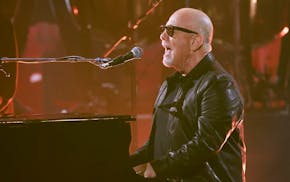Writer Aaron Sorkin is a dreamer. In "A Few Good Men," he dreamed that David could beat Goliath, even when the giant looks a lot like Jack Nicholson. In "Sports Night," he dreamed that co-workers could fall in love without ending up in human resources. In "The West Wing," he dreamed that politicians could be noble enough to place passion ahead of popularity.
His latest project offers an equally ludicrous fantasy: Cable news could be better. Because it's from Sorkin, one of the most convincing, cockeyed optimists in the entertainment world, you almost believe him.
"The Newsroom," which debuts Sunday on HBO, introduces us to Will McAvoy (Jeff Daniels), a cold fish who has developed into cable's second-most-watched anchor by playing it down the middle. He never takes sides, never questions guests' preposterous statements, never pushes the envelope -- just the way the brass likes it.
But McAvoy is about to have a Sorkin reawakening, which means that when he's not walking-and-talking at superhuman speed, he's going to reclaim journalism as an honorable profession.
Pushing him to change his vanilla ways is a dedicated, sleepy-eyed staff that bears more than a passing resemblance to President Jed Bartlet's administration: frenzied executive producer Mackenzie McHale (Emily Mortimer), an ex-flame whom McAvoy hasn't seen in three years, and crotchety news division president Charlie Skinner, who's so brave-hearted and determined he could be played only by Sam Waterston.
"In the old days -- or 10 minutes ago -- we did the news well," says Skinner in one of his inspirational pep talks. "You know why? We just decided to."
Sorkin's idea of "good journalism" may rattle viewers accustomed to newscasts that insist there are two sides to every story. His scripts ridicule reality TV, gossip columnists, Arizona's immigration act, the Tea Party and Minnesota Rep. Michele Bachmann, who is dismissed by one character as "just a hairdo."
"Facts are the center," Skinner says. "Balance is irrelevant."
The common enemy -- network executives who don't want to tick off radical politicians in a position to block business deals -- is splendidly represented by the network's CEO, Leona Lansing, who doesn't appear until the third episode. It's worth the wait, since she's played by Jane Fonda, ex-wife of CNN founder Ted Turner.
"What happened to human interest stories?" she says while threatening to sabotage McAvoy if he doesn't retreat to softer news.
Those who don't share Sorkin's liberal stance still may be dazzled by the witty, rat-a-tat dialogue and the buzz of a newsroom during a breaking story like the Louisiana oil spill or the shooting of Gabby Giffords. What won't reel them is Sorkin's idea of sexually charged banter, which has always been his weakness.
Sparks between McAvoy and McHale don't fly, they sputter. The competition between two very different producers to win the heart of a young producer (Alison Pill) feels like a feeble attempt to set up a "Twilight"-like audience rivalry between Team Jacob and Team Edward.
Not that Sorkin isn't a romantic. He's madly in love with the flow of smart dialogue, workaholics, noble ideas and Frank Capra.
In Sorkin's eyes, it could be a wonderful life -- if we just decide it is.
njustin@startribune.com • 612-673-7431 • Twitter: @nealjustin

What to watch: 'Jinx 2′ assumes we haven't had enough of convicted murderer Robert Durst

Neal Justin: Why Conan O'Brien is a national treasure

TV review: 'Jane' is the best heroine for families prepping for Earth Day

CBS will turn the lights back on for Billy Joel concert


